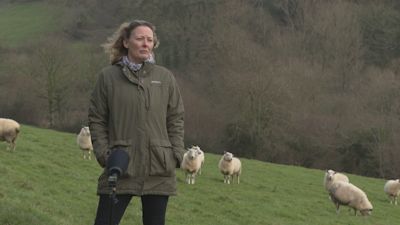'It's horrible' - rise in dog attacks sees farmers reduce sheep flock

Watch Bob Cruwys' report
A West Country sheep farmer says she has had to get rid of three quarters of her flock because they kept being attacked by dogs.
Wildlife trusts says the problem is putting huge pressure on nature reserves and other open spaces, with livestock and wildlife being disturbed and chased by dogs on a daily basis.
Nicola Westlake farms with her husband and his brother and has had to deal with numerous dog attacks.
Last year, one of her pregnant ewes was attacked in this field and the injuries were so severe the animal had to be put down. The effect on the rest of the flock was obvious.
She told ITV News West Country: "They were all huddled in the corner of the field which suggests that they'd been chased for quite a long period of time and they wouldn't leave each other for days after that, they moved everywhere in a little huddle.
"For us it's horrible seeing an animal that you care for and look after.
New figures for the insurance company NFU Mutual show dog attacks on livestock across the South West cost more than £185,000 last year.
Across the country it's gone up by 10 per cent, partly due to an increase in pet ownership during the coronavirus pandemic and more people have been exercising their dogs in the countryside.
Phoebe Ridley, of NFU Mutual, said: "A dog is an animal and they have a mind of their own and as much as you may trust your pet they can still go off and run around sheep.
"A lot of people would say a dog attack is where the animal has been injured, but actually it's the distress that your dog can cause simply by being in a field with animals."
Nicola Westlake's farm used to have 400 breeding ewes on it, producing around 600 lambs a year - but they just didn't feel able to protect them all.
She said: "We've had to reduce that number significantly. About 50 per cent of our fields have public rights of way through them.
"As a direct result of the number of dog attacks that we were getting, we've reduced our flock to about 90 breeding ewes now and that's purely and simply because that's the only number we can really keep safe in the fields that we have that are well fenced."
Read more: